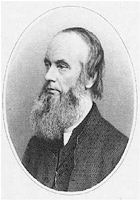A Villiage Tale. Related Almost In The Words Of The Narrator. Poem by Henry Alford
A Villiage Tale. Related Almost In The Words Of The Narrator.
He was a blessed father; and he taught
Us, his four children (for in that my day
There were no schools as now) the way to read
The wonderful account, how this large world
Came into being, and the sun and moon,
And all the little stars that deck the heavens.
He loved my mother; and when her he lost,
And first came home among the sable train
Of mourners, and his desolation sank
Into his soul, we thought his heart would burst.
But soon he built him up another home
In a new partner's breast. She loved us all
As if we were her own: and 'twould have made
Your heart rejoice to see my father sit
After his daily labour, self--deceived
Into domestic happiness, and blest
With us his rosy circle. But stern Death
Envied the healing of the breach he made,
And took our second mother. By this time
My father was in years; and I believe,
Without the two chairs filled beside the fire,
And some one to be busy and bear rule
In the house--matters, and to share his bed,
He would have known no peace. Therefore a third
He led to church, and brought to live with us.
But, oh, how changed was now our quiet hearth!
A strange and wayward woman; one who went
From church to meeting, and then back to church,
And got no good from either. She would be
Days without speaking; and in sudden mood
Pour forth such hours of wild and rambling talk,
That we all shook to hear her. Happily
My father knew not all; unsensing age
Came fast upon him, and his daily meal
And daily fire, and journey to his bed,
Were all he sought or knew. One winter night
I woke from sleep, and heard, or seemed to hear
Fierce struggling in their room, which joined our own.
There was no door; I left my bed, and crept
To the open ground--sill; but 'twas quiet all,
And pitch, pitch dark. Whether she heard me there
I know not; but I had scarce regained my bed
When she came to me, flying like distraught,
``Jenny, your father's lying stiff and still,
And will not be awaked.'' I thought it strange
That she should try to wake him at midnight;
But I said nothing. Sir, I said before
He was a blessed father; and we mourned
Our very hearts out. Long before this time
My sisters had been married: so 'twas mine
To live with my strange mother. We were then
In the old meeting--house that was; you know
The place: the stones that were beside the hearth
Were coverings of graves. 'Tis a lone house,--
A dismal, dismal place. Well, from the hour
My father died, this woman had no peace.
By day she never kept to the same chair
Five minutes at a time. Now she would rise
And stir the fire, now stare into the street,
Now work a stitch or two; then fling her out
Without a hat or shawl, and roam about
The village and the fields; and in the night,
Oh, sir, 'twas dreadful; she would never go
Up--stairs; but she and I slept in a bed
Placed in the lodging room, and all among
The grave--stones;--trust me, 'twas a dismal thing.
All night she never slept; and when I woke,
Whether at midnight or in dawn of morn,
I felt her beating with her lifted hand
Backward and forward, all about her breast:
``Mother,'' said I, (for though she was not so,
We always mother'd her,) ``you have not yet
Done beating of him off.'' So she went on:
And happy, sir, was I when the time came
For me to leave her, and set up a home
Some twenty houses off, in love and peace,
With my own husband. We'd been married now
Some fifteen weeks, when, as I sat at work,
A neighbour came in haste, with wildered looks,
``Go to your mother.'' Up I rose and went;
And oh, sir, what a scene: the doctor stood
With hands and arms all bloody, sewing up
A hideous wound. ``Oh, mother, what a deed
Have you been doing!'' After that she lived
Three weeks, but never spoke; and as she lived,
So, sir, she died; a wretched, wicked woman,
With strange unbridled thoughts; and deeds--God knows
What were her deeds: one day thev will be shown.
This poem has not been translated into any other language yet.
I would like to translate this poem